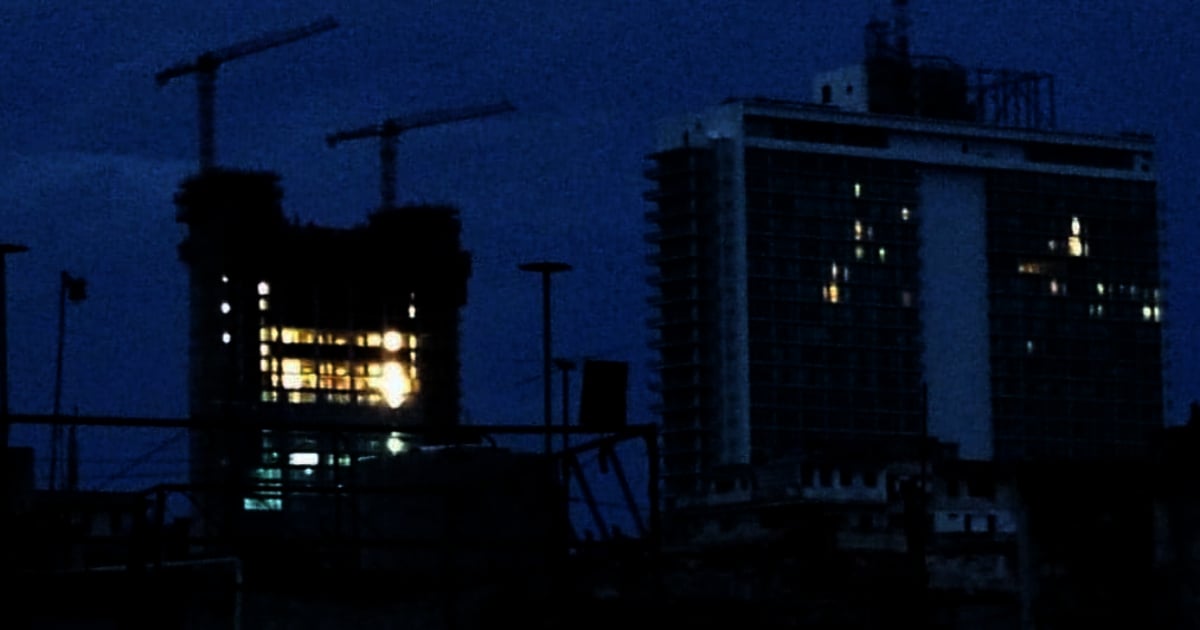
The Cuban Electric Union (UNE) reported that the National Electric System (SEN) is facing a severe power generation crisis that is affecting the electricity supply in much of the country over the weekend.
The energy outlook remains critical, with a deficit of over 1,200 MW expected during peak hours this Sunday, December 8. On Saturday, the deficit reached 1,526 MW at 6:10 PM, coinciding with the time of maximum demand.
For this Sunday, "it is estimated that at peak times there will be a supply of 1,850 MW and a maximum demand of 3,050 MW, resulting in a deficit of 1,200 MW. Therefore, if the projected conditions persist, a shortfall of 1,270 MW is forecasted during this period," stated the state-owned company on its social media.
Currently, units 5 of the Mariel Power Plant, unit 2 of the Felton Power Plant, and unit 6 of the Renté Power Plant are out of service due to breakdowns. Additionally, four other units are undergoing maintenance, including the plants in Cienfuegos, Santa Cruz, and Nuevitas.
The generation deficit is also impacted by the lack of fuel, which has left 56 distributed generation plants and two engines from the Santiago de Cuba truck out of operation, resulting in a total loss of 309 MW due to this issue.
UNE anticipates that unit 1 of Energás Jaruco will come online with an additional 30 MW, while unit 6 of the same plant will add another 80 MW. However, these additions will not be sufficient to meet the expected demand.
If the current conditions persist, widespread blackouts will continue to affect much of the country, further complicating daily life for Cubans amid an energy crisis that seems far from being resolved.
The energy crisis in Cuba intensified in December 2024, with frequent blackouts affecting a significant portion of the population.
On December 4th, the national electricity system collapsed due to a failure at the Antonio Guiteras Thermal Power Plant, the country's main facility, leaving millions without electricity. This incident marks the third of its kind in less than two months, highlighting the fragility of Cuba's electrical infrastructure.
The situation has been worsened by fuel shortages and a lack of maintenance in the generating plants. Additionally, natural phenomena such as Hurricane Rafael have caused significant damage, further complicating the generation and distribution of electricity.
The company led by Alfredo López Valdés has implemented scheduled blackouts of up to eight hours a day to manage the generation deficit, which, according to reports on social media, can be even greater in some areas.
The situation has led to protests and criticism of the authorities due to the lack of effective solutions. The combination of technical failures, natural disasters, and structural issues has plunged Cuba into a deep energy crisis, affecting the quality of life for its citizens and highlighting the urgent need for reforms in the electricity sector.
In December, Cuba has faced significant blackouts due to electricity generation deficits averaging 1,400 MW.
Frequently Asked Questions About the Energy Crisis in Cuba
Why do massive blackouts occur in Cuba?
The massive blackouts in Cuba are due to a significant shortfall in electricity generation capacity, caused by malfunctions in thermal power plants and a lack of fuel for distributed generation. This situation is exacerbated by unit maintenance and adverse weather conditions, highlighting the fragility of the Cuban electrical system.
Which power plants have been most affected in Cuba?
Currently, the thermal power plants most affected include unit 5 of the CTE Mariel, unit 2 of the CTE Felton, and units 3 and 6 of the CTE Renté. Additionally, other units are undergoing maintenance at the CTE Santa Cruz, CTE Cienfuegos, CTE Nuevitas, and Boca de Jaruco, which is limiting the country's electricity generation capacity.
How does the lack of fuel impact the energy crisis in Cuba?
The lack of fuel in Cuba has taken numerous distributed generation plants out of service, significantly affecting the response capacity of the National Electric System (SEN). This shortage contributes to the generation deficit and the widespread blackouts the country is experiencing, further complicating the energy situation.
What measures has the Cuban government implemented in response to the energy crisis?
The Cuban government has attempted to partially incorporate some thermal power plants and restore areas affected by outages. However, these measures have been insufficient to resolve the energy crisis, and the lack of fuel remains a critical barrier to a short-term solution.
What is the impact of the energy crisis on the Cuban population?
The energy crisis in Cuba severely affects the daily lives of Cubans, leading to widespread frustration and annoyance due to ongoing blackouts. The lack of electricity impacts the quality of life, resulting in wasted food and increasing despair, which is reflected in protests and demonstrations against the regime in various regions of the country.
Filed under: